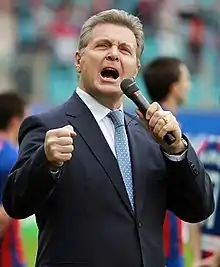Lev Leshchenko
Lev Valerianovich Leshchenko (Russian: Лев Валерьянович Лещенко; born 1 February 1942), is a Russian singer,[1] who is best known for his rendition of "Den Pobedy" and the 1980 Summer Olympics closing ceremony theme song "Do svidanja, Moskva".
Lev Leshchenko Лев Лещенко | |
|---|---|
 | |
| Background information | |
| Born | 1 February 1942 Moscow, Soviet Union |
| Genres | soviet music, Operatic pop, pop |
| Occupation(s) | Singer |
| Website | www.levleschenko.ru |
Biography
Lev Leshchenko was born on 1 February 1942 in Moscow, Soviet Union. His father, Valerian Andreyevich Leshchenko (1904–2004), was a Red Army officer who was at war outside of Moscow. He was awarded medals for his participation in the Second World War. His mother, Klavdiya Petrovna Leshchenko (née Fedoseyeva; 1915–1943), died shortly after Lev was born.[2] His grandparents, along with his stepmother Irina Pavlovna Leshchenko, whom his father married in 1948, brought Leshchenko up in Sokolniki, Moscow. During his childhood, he was introduced to classical music and theatre, and began performing songs by Leonid Utyosov.[3][4]
Between 1960 and 1959, Leshchenko worked as a stagehand at the State Academic Bolshoi Theatre, and before being conscripted into the army in 1961, he worked as an adjuster at a precision measuring instrument factory. Leschenko served in the mechanical vehicle division of the Soviet Army, positioned in the German Democratic Republic. On 27 January 1962, Leshchenko (then a private) became a soloist within the Soviet Red Army Ensemble, and received an offer to remain in the army. Leshchenko accepted every role offered to him by the ensemble, from singing in a quarter, conducting concerts and even reading verses, where it is said his entertainment career began. At the same time, he was preparing for the theatrical examinations of the Russian Academy of Theatre Arts (abbreviated as GITIS), the most respected theatrical school of the Soviet Union, which he passed and was successfully admitted to in September 1964.[5]
Leshchenko began touring with concert bands, visiting some of the more isolated parts of the country. In 1969, Leshchenko was admitted as a member of the Moscow Operetta Theatre. He took up many minor musical roles, but was aware of his musical gift and was constantly looking for soloist acts. On 13 February 1970, having won a contest held by the state radio station, Leshchenko became a solo vocalist for the Soviet state radio station.
In 1975, Leshchenko performed "Den Pobedy", an immensely popular Soviet song dedicated to Victory Day, which was initially disliked by the authorities due to its unconventional music style. His rendition has become by far the most well known.[6] In 1999 Leshchenko was given a star on the Star Square in Moscow.[6]
In March 2014 he signed a letter in support of the position of the President of Russia Vladimir Putin on the Russian annexation of Crimea.[7] For this he was banned from entering Ukraine.[8] Crimea has been under dispute by Russia and Ukraine since March 2014.[9]
Popular Songs
- "Solovyinaya roshcha" ("Соловьиная роща") – "Nightingale Grove"
- "Proshay" ("Прощай") – "Good Bye"
- "Prityazhen'ye Zemli" ("Притяжение Земли") – "Gravity of the Earth"
- "Den Pobedy" (День победы) – "The Day of the Victory"
- "Ni Minuty Pokoja" (Ни минуты покоя) – "Not a Minute's Peace"
- "Rodnaya zemlya" ("Родная Земля") – "Native Land"
- "Roditelskiy dom" ("Родительский дом") – "The Parental Home"
- "Ne plach' devchonka" ("Не плачь, девчонка") – "Don't Cry, Girl"
Personal life
From 1966 to 1976, he was married to Alla Abdalova. The marriage lasted 10 years, and ended in divorce, initiated by Abdalova.[10]
Honours and awards


- Orders
 Order "For Merit to the Fatherland" 1st class (24 October 2017)[11]
Order "For Merit to the Fatherland" 1st class (24 October 2017)[11] Order "For Merit to the Fatherland" 2nd class (30 January 2012)
Order "For Merit to the Fatherland" 2nd class (30 January 2012) Order "For Merit to the Fatherland" 3rd class (1 February 2007)
Order "For Merit to the Fatherland" 3rd class (1 February 2007) Order "For Merit to the Fatherland" 4th class (31 January 2002)
Order "For Merit to the Fatherland" 4th class (31 January 2002) Order of Friendship of Peoples (14 November 1980)
Order of Friendship of Peoples (14 November 1980) Order of the Badge of Honour (17 August 1989)
Order of the Badge of Honour (17 August 1989) Order of Friendship (Kazakhstan)
Order of Friendship (Kazakhstan)
- Titles
- People's Artist of the RSFSR (1983)
- Honoured Artist of the RSFSR (1977)
- Honoured Artist of the Transnistria (2015)
- People's Artist of the South Ossetia (2010)
- People's Artist of the North Ossetia-Alania (2015)
- Honorary Citizen of Kursk Oblast (2012)
- Awards
- Lenin Komsomol Prize (1978)
- Belarus president award Through Art - to Peace and Understanding (2012)
References
- David MacFadyen, Red Stars: Personality and the Soviet Popular Song, 1955–1991 McGill-Queen's Press, 2001, ISBN 9780773521063, 319 p.
- Панорама — Газета «ФАКТЫ и комментарии»
- http://www.leschenko.ru
- Аргументы и факты — Семья газет для всей семьи! Archived 2 July 2015 at the Wayback Machine
- Russiansabroad.com Archived 24 August 2007 at the Wayback Machine
- Лев Лещенко / Lev Leschenko
- "Деятели культуры России — в поддержку позиции Президента по Украине и Крыму". Ministry for Culture of Russian Federation. Archived from the original on 11 March 2014.
- SBU issues entry ban against 140 Russian artists, UNIAN (5 November 2016)
Ukraine’s State Security Service bans 140 Russian cultural figures from entering country, TASS news agency (5 November 2016) - Gutterman, Steve. "Putin signs Crimea treaty, will not seize other Ukraine regions". Reuters. Retrieved 26 March 2014.
- "Тяжкий грех Льва Лещенко". 9 September 2010.
- Указ Президента Российской Федерации от 24.10.2017 № 512 «О награждении государственными наградами Российской Федерации» // Официальный интернет-портал правовой информации
External links
- Official website
- Softpanorama c links
- Lev Leshchenko at iTunes
- Lev Leshchenko discography at Discogs
- Сайт поклонников творчества Льва Лещенко